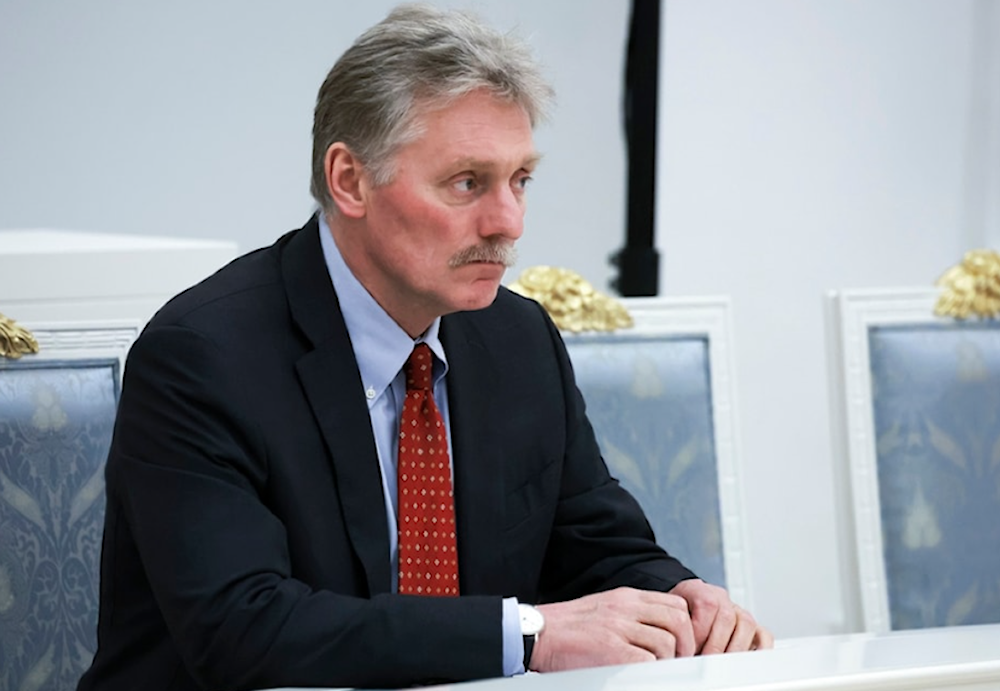Kremlin dismisses reports of German CEO assassination plot
This follows CNN reports that the US informed Germany of a Russian government plot to murder Rheinmetall CEO Armin Papperger.
-

Kremlin Spokesperson Dmitry Peskov attends a meeting of Russian President Vladimir Putin with the new cabinet members at the Kremlin in Moscow, Russia, on May 14, 2024. (AP)
The Kremlin has refuted reports that Russia was trying to assassinate the CEO of a major German arms manufacturer, Rheinmetall, that supplies weapons to Ukraine.
CNN said Thursday, citing five anonymous US and Western sources, that the US divulged to Germany that the Russian government planned to murder Rheinmetall CEO Armin Papperger.
Rheinmetall stated in February that it had reached a deal with a Ukrainian business to produce artillery ammunition and announced its intention to establish at least 4 plants in Ukraine to produce shells, military vehicles, gunpowder, and anti-aircraft weaponry.
When asked about the allegation on Friday, Kremlin spokesperson Dmitry Peskov rejected it as "fake" and said it could not be taken "seriously".
"It is very difficult for us to comment on reports from various media outlets that do not contain any serious arguments and are based on anonymous sources," Peskov said in a press conference call. He added that it was "all presented in the style of another fake story."
According to the German weekly Spiegel, Western security services have identified numerous persons in connection with the plot against Papperger.
Spiegel said the suspects were from former Soviet Union countries, with at least one Russian among them.
As per the publication, the suspects were believed to have traveled to the company's headquarters in Dusseldorf, as well as Papperger's international holiday locations.
Security agencies suspected the suspects were "proxies" for Russian intelligence, but the evidence against them was insufficient to justify an arrest, according to Spiegel.
The German government declined to comment directly on the CNN article but did emphasize its disapproval of Russia's "hybrid war of aggression," with Interior Minister Nancy Faeser saying on X that Germany will "not be intimidated by Russia and will continue to do everything to prevent Russian threats in Germany."
Rheinmetall spokesperson Oliver Hoffmann stated Thursday that the business was "unable to comment on issues relating to corporate security."
Zelensky urges NATO leaders to lift all limits on striking Russia
Yesterday, Ukraine's President Volodymyr Zelensky urged NATO leaders to lift all limits on allowing Kiev to strike inside Russia with Western weapons as they concluded a three-day summit in Washington.
The Ukrainian leader met with his NATO counterparts after getting pledges of new air defenses for Ukraine and as allies began transferring long-awaited F-16 jets.
But Zelensky urged Kiev's supporters, particularly the United States, to go farther, including giving his outnumbered soldiers more freedom to strike inside Russia, telling the press that "if we want to win, if we want to prevail, if we want to save our country and to defend it, we need to lift all the limitations."
In May, key allies such as Washington and Germany lifted restrictions on Ukraine striking within Russia but maintained some constraints on how far and under what conditions Kiev might strike.
Meanwhile, on Wednesday, the US revealed that "episodic deployments" of long-range missiles to Germany will begin in 2026, detailing they would be permanently stationed there and would have "significantly longer range" than current US weapons in Europe.
German Chancellor Olaf Scholz hailed the measure, saying it would contribute to "securing peace".
However, on Thursday, the Kremlin responded, and Kremlin spokesperson Dmitry Peskov said Russia was contemplating "response measures" to counter the alliance's "very serious threat."

 4 Min Read
4 Min Read








